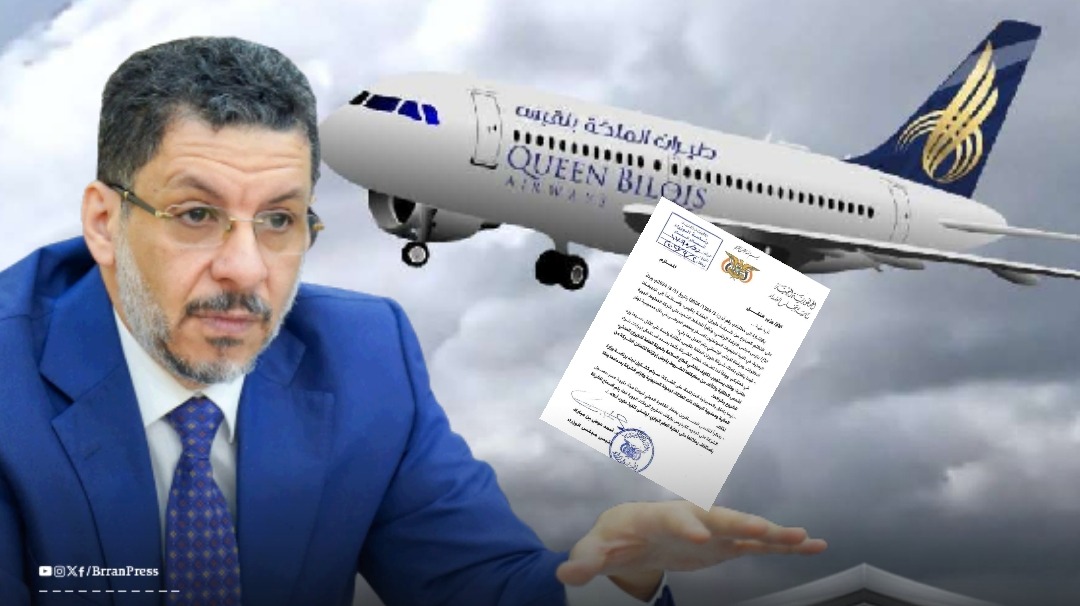


Barran Press
Yemeni Prime Minister Ahmed Awad bin Mubarak on Saturday, September 7, 2024, ordered the resumption of flights for Qween Bilqis Air, owned by businessman Ahmed Saleh al-Eisi, until the end of the year.
The order, addressed to Transport Minister Abdulsalam Hamid, a loyalist of the Southern Transitional Council, was revealed by Barran Press. The Prime Minister justified the decision by citing the "accumulation of passengers at Cairo International Airport due to the company's failure to renew its license and the suspension of its flight permits."
According to the memo, bin Mubarak's decision was based on an appeal filed by Qween Bilqis Air. The company's resumption of flights was deemed necessary due to the heavy pressure on Yemenia Airways to meet the travel needs of citizens, including patients, amidst limited aircraft availability.
The memo stated that Qween Bilqis Air is in the process of completing the purchase of an aircraft, necessitating the assignment of safety inspectors from the General Authority of Civil Aviation and Meteorology to inspect the aircraft and ensure its compliance with regulations for authorization.
Regarding the company's debt, the Prime Minister's memo stated that a committee headed by the Ministry of Finance, with the participation of relevant entities, would be formed to schedule the debt and oblige the company to repay it accordingly.
Earlier in the day, Qween Bilqis Air issued a statement accusing the Yemeni Ministry of Transport, the General Authority of Civil Aviation and Meteorology of deliberately halting its operations, labeling the suspension as a crime.
The statement, published on the company's official Facebook page, was seen by Barran Press. It stated that it was a response to a previous statement by the Ministry of Transport, which it deemed "full of falsehoods, lies, and distortions of the truth."
The company criticized the Ministry's previous statement, describing it as "tense" and "depriving these official bodies of their meaning."
Qween Bilqis Air refuted several claims made by Minister Abdulsalam Hamid, a loyalist of the Southern Transitional Council. It contested the minister's description of the Deputy Minister, Captain Mohammed Maqbel, as one of Yemen's most skilled pilots, arguing that it was a cover-up for the minister's serious violation in appointing Maqbel as head of the safety sector at the General Authority of Civil Aviation, in violation of all local and international laws.
The company questioned how Captain Maqbel, who works as a pilot for Yemenia Airways, could be assigned a position that allows him to supervise and inspect the work of a competing company, highlighting a conflict of interest.
Qween Bilqis Air asserted that Minister Hamid attempted to imply that the company's owner, Ahmed Saleh al-Eisi, had exploited his position in the Presidential Office to obtain the company's license. The company countered this by stating that it received its license in 2013 under the name of businessman Mukhtar al-Dhaiba, and ownership was transferred to al-Eisi after purchasing it from its owner in 2016.
Regarding its ownership of aircraft, the company stated that it never claimed ownership, refuting the Ministry's denial and fabricated lies. It emphasized that it has been operating under the ACMI system since receiving its license from the General Authority of Civil Aviation.
The company explained that ACMI is a global system used by many companies, and if the Minister understood it, he would realize that the responsibility for maintenance, supervision, and training lies with the company leasing the aircraft under the ACMI system. It operates in Yemen, as well as in countries like Egypt, Saudi Arabia, and Europe.
The company questioned why the Minister granted a one-year flight license to a new airline operating under a lease system without owning an aircraft, and why he did not require presidential or government directives to grant the license, despite implementing them without hesitation when they existed.
Qween Bilqis Air pointed out that its continued operation under the lease system was not a choice but a necessity due to the difficult circumstances and conditions in Yemen.
It attributed this situation to the current Transport Minister, claiming that when he was responsible for the self-administration committee announced by the Southern Transitional Council, he had not yet paid the value of an oil shipment belonging to al-Eisi that was supplied to electricity through the oil company, exceeding $25 million. The company stated that this amount was sufficient to purchase aircraft, in addition to the large outstanding debt owed to al-Eisi by the state.
The company accused the Transport Minister of failing to comply with the directives of the President of the Presidential Leadership Council, Rashad al-Alimi, and the Prime Minister to extend the company's operations until the end of the year and complete the aircraft registration procedures. It stated that it was clear the Minister did not recognize the President or the Prime Minister.
Qween Bilqis Air demanded that the Presidential Leadership Council form an urgent committee to investigate the Transport Minister, who it accused of marginalizing the role of the General Authority of Civil Aviation and performing its duties while enjoying the suffering of passengers stranded at airports in Cairo, Jeddah, and Aden, which continues to this day.
The company stated that it holds the Ministry and the General Authority of Civil Aviation fully responsible for everything that happened as a result of the deliberate suspension and reserves its legal right to sue them and demand compensation for all the losses it has incurred.
On Thursday, September 5, the Ministry of Transport published a joint statement with the General Authority of Civil Aviation on its official website, stating that they would not allow the operation of an aircraft by a company that lacks safety standards and criteria, exposing passengers to potential risks and air disasters and jeopardizing their financial rights.